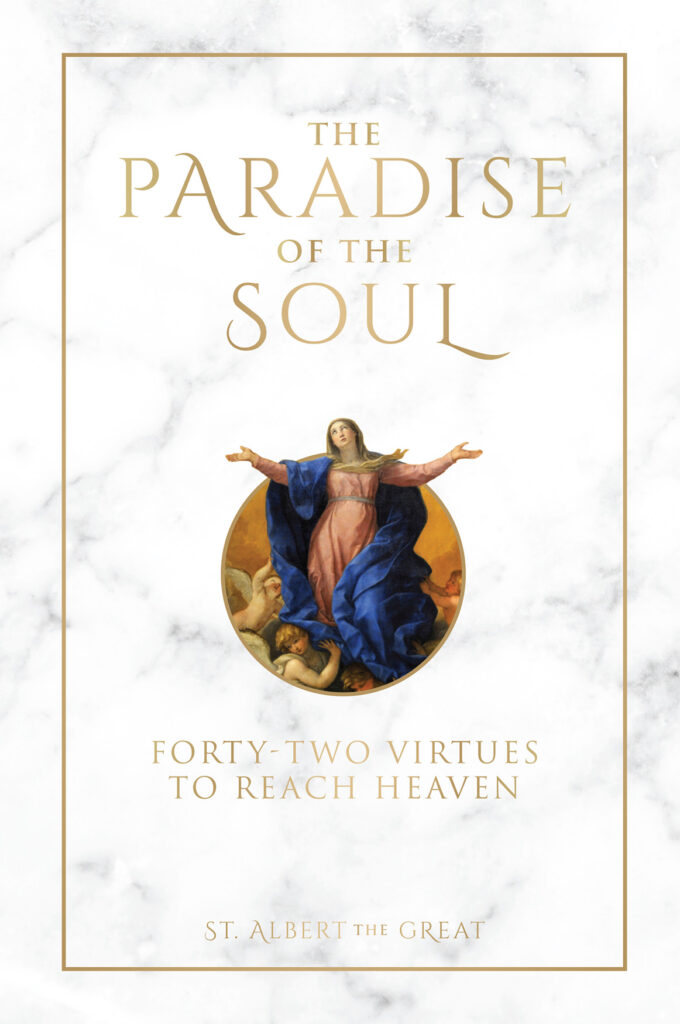Without penance, salvation is impossible. For Our Lord Himself states, “Unless you do penance, you will all perish.” (Luke 13:3). In this reflection, Saint Albert the Great discusses the virtue of penance, how to distinguish true penance from false penance, and ends with a prayer to obtain this necessary virtue.
The Virtue of Penance
True penance, in an exterior sense, consists of voluntarily abstaining from certain permitted and lawful things in order to obtain mercy for having done acts which are not permitted. Thus penitents and enclosed religious abstain from red meat and from the wearing of fine garments. They fast and keep vigils and silence, and renounce their own wills through obedience to superiors. All the things they give up are, in themselves, perfectly licit for human beings, yet they forgo them for the sake of meriting God’s mercy and grace more abundantly. This is in accordance with the injunction of John the Baptist, who exhorted the people to “do penance, for the Kingdom of God is at hand.”
The very necessity of penance ought to lead us to cultivate and practice this virtue. For without it, salvation is impossible to obtain, in accordance with the statement of the Lord: “Unless you do penance, you will all perish.” And similarly, Saint Augustine writes, “Sins, whether small
or great, will never remain unpunished.” Hence the Lord enjoined David to do penance for his sins, after he had sinned by conducting a census of his people, giving him the choice of either enduring famine for seven years, or falling into the hands of his enemies for three months, or suffering plague for three days. And David chose the last option, placing himself and his people into the hands of the Lord to be subjected to the perils of the plague. Through this narrative, the necessity of penance to atone for sins is figuratively signified. For sins can be punished either by the eternal fires of hell (which is what is signified by the seven years of famine), or in purgatory (which is signified by the violent attacks of the enemy, lasting for three months), or by doing penance in this present life (which is signified by the three days of pestilence). It is certainly most advisable for us all to choose the last option, of penance in this life, since it involves the lightest suffering and passes by the most swiftly.
Signs of True and False Penance
A sign of true penitence is for a person to undertake works that amount to an adequate and fully commensurate atonement for his faults. The works of penance should be in accordance with the quantity and seriousness of the sins committed. The bitterness of the penance should be commensurate to the pleasures of the sins, the duration of the penance should be commensurate with the duration of the sins, and the multiplicity of the penance should be commensurate with the multiplicity of the sins. It is in accordance with this principle that John the Baptist urged, “Bring forth fruits of penance [which are] fitting [to the faults being atoned for].”
Each illness of the body has its own suitable and necessary medicine, and there is no one single medicine or treatment that can cure every ailment of the body. In the same manner, each kind of sin and vice has its own particular kind of fitting and effective penance, [and unsuitable forms of penance are less efficacious as remedies. For example,] pride is not normally cured by almsgiving, nor is avarice corrected by fasting, nor are lustful thoughts removed by keeping vigils. But pride is corrected by works of humility, avarice is corrected by giving alms, lustfulness is remedied by physical austerity. Gluttony is effectively treated by practicing fasting, talkativeness is controlled by silent prayer, and envy is healed by fraternal charity. A suitable penance for theft must obviously include the restoration of whatever was stolen.
But even if a person is not capable of completing a penance that is fully commensurate with his sins, then (as Saint John Chrysostom says) the good Lord Himself will supply what is lacking. Thus if a person had acquired something unjustly and it is no longer possible to restore it to its rightful owner, fasting could suffice as atonement. But if the person was not able to fast for some reason, prayer would be sufficient. And if the person was not even able to pray (because of sickness of body or infirmity of mind), a good intention alone could be enough in the sight of God.
Pope Innocent [III] identified several indications of false or insincere penance. These include when the person undertaking the penance does not withdraw himself from the occasions of sin, or if he feels resentment or bitterness in his heart about the penance he is doing, or if he does not undertake to make suitable reparation for the injuries he has caused, or if he refuses to forgive others for injuries he himself has sustained.
Another sign of a false penance is when, after completing the prescribed work of atonement for a sin, the person then proceeds immediately to commit the same sin once again.
A Prayer to God for True Penance
O Lord, You are the most perfectly just and equitable Judge. You allow no merit or work of virtue to go unrewarded, and You permit no sin to remain unpunished. Yet, in Your immense mercy, You afford to sinners the opportunity to atone for their offenses by means of penance during this present life, and thus to avoid the dreadful torments of purgatory or the eternal flames of hell in the life to come.
Help me to bring forth worthy fruits of penance so that I may make satisfactory atonement for all my sins while I am still alive in this world. Through acts of penance, may I fulfill all that Your perfect justice requires of me, in accordance with my own limited strength and capacities. Merciful Lord, grant me the grace and wisdom to deny myself some of those things that are permitted to me in order to atone for my sinful indulgence in those things which are forbidden. Amen.
ooo
This article is taken from a chapter in The Paradise of the Soul: Forty-Two Virtues to Reach Heaven by Saint Albert the Great which is available from TAN Books.









